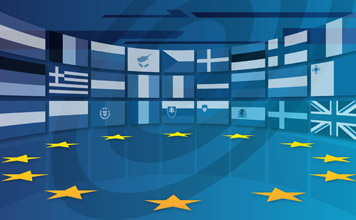The European Policies programme undertakes research and activities to improve European integration, inform the public debate on EU affairs and encourage civic partition in common European issues based on the principles of the open society. OSI-Sofia promotes European values and supports the European project, deemed beneficial for the European citizens and countries. The European Policies has maintained a strong focus on the convergence of the newer member states – Bulgaria and the other CEE countries – to the rest of the EU to maximize the benefits of EU membership and elicit lessons learned for the EU’s candidate countries and partners.
OSI-Sofia European Policies Programme conducts evidence-based policy research, comparative studies and public opinion surveys to offer independent analysis, commentary and data to the public, the media, decision-makers, civic activists and business leaders on current and upcoming EU affairs. The issues range from the broader convergence and divergence processes in Europe to media literacy, democracy and governance in the EU and its neighborhood, integration projects as Schengen and the Eurozone, demography and migration, energy and climate, enlargement and foreign policy, etc. Through its activities and products – such as the annual Catch-Up Index reports and timely policy briefs – OSI-Sofia has become a go-to source and partner on EU affairs, cooperating with a broad network of independent think tanks, academics and civic activists in Bulgaria and abroad.
Several flagship initiatives and publications have become the hallmarks of the European policies program with broad national and international coverage.
The Catch-Up Index, published annually from 2011, registers the processes of convergence and divergence in the EU and the catching-up of new EU members to the older EU members in economy, democracy, quality of life and governance. It ranks and compares 35 European countries across 47 basic indicators. A dedicated web-platform (www.TheCatchUpIndex.eu) contains the unique data-set and offers the opportunity for users to construct their own rankings. The Index was listed among the key resources on EU by the renowned University ETZ Zurich, quoted by prominent media such as the Czech-language Hospodářské noviny, included in the reading list of the European Parliament’s in-house research service and think tank (EPRS), presented to the Canada-Europe Parliamentary Association (CEPA).
EuPI (the European Policies Initiative) was established in 2008 to contribute to the new EU member states from Central and Eastern Europe becoming more effective members of the EU and benefit more from their membership. A dedicated web-site with publications in English for the international outreach has been launched. Several major comparative studies were conducted on the then 10 EU new member states regarding shaping of positions and participation in key European policies – energy and climate, migration, foreign and defense policy, enlargement, the national policy priorities besides EU accession that were largely left unaddressed – national policies in education, healthcare, agriculture, regional development, minority integration, the effects of the Eurozone membership, etc.
The Media Literacy Index, covering most European countries, was launched in 2017 to address the issue of the post-truth phenomena and the related political, social and media aspects (Can this be true?: Predictors of media literacy and resilience to the post-truth phenomenon in Europe). With its second edition in 2018, it became one of the most covered OSI-Sofia reports internationally from Finland (Finnish Journal of Foreign Affairs) and Estonia’s MFA to interviews for N1 TV in Serbia.
The 10 Years in the EU series of analyses has been devoted to major aspects of Bulgaria’s membership in the EU from 2007, focusing on migration and demographic (Migration Trends in Bulgaria), benefits of membership such as roaming (Europe, roaming and telecommunications), public attitudes on membership and other key issues (Public opinion in Bulgaria in 2018: EU membership and further integration).
Contact person:
Marin Lessenski
mlessenski@osi.bg












